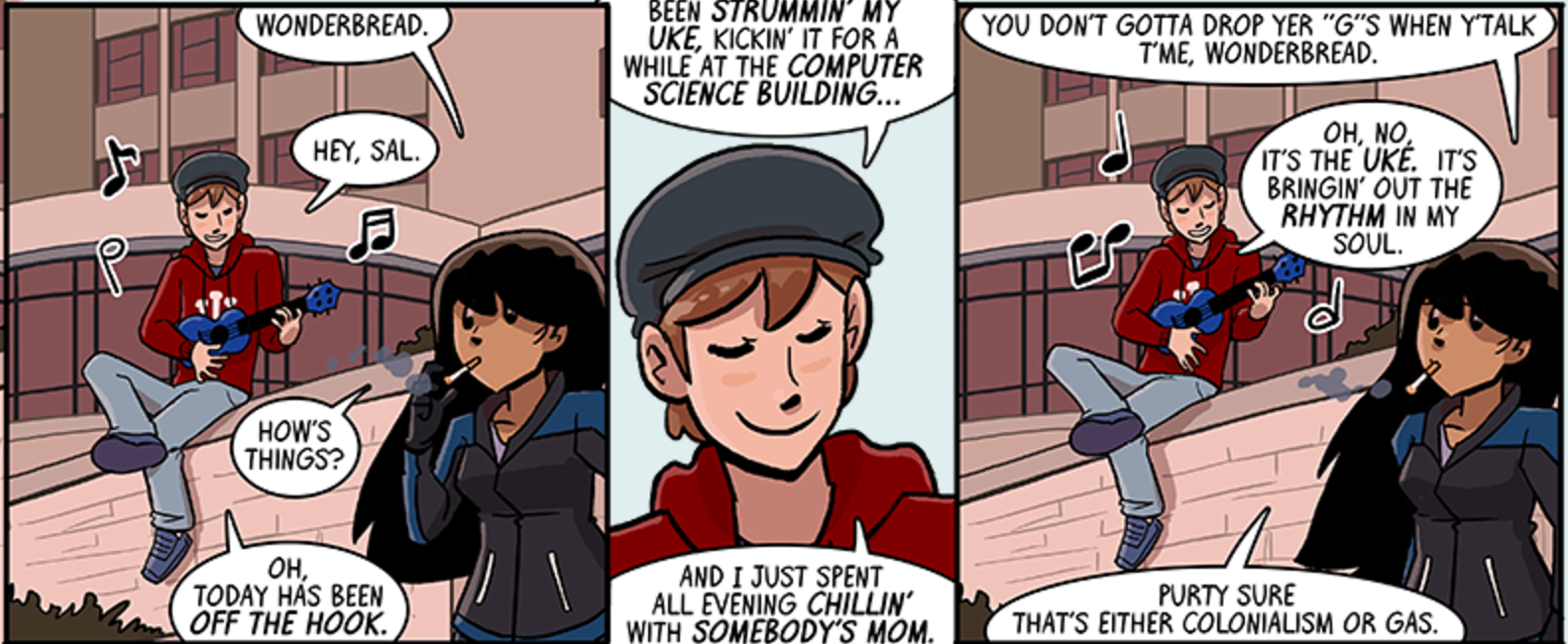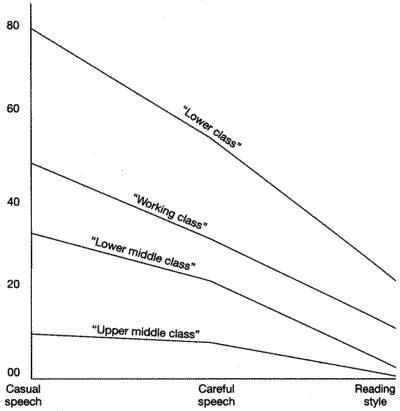Colonialism or gas
« previous post | next post »
The last three panels of Dumbing of Age for 8/10/2017, featuring Danny and Sal:

Mouseover text: "They have a similar smell."
What I wrote about g-dropping a dozen years ago ("The internet pilgrim's guide to g-dropping", 5/10/2004):
In fact, there is no "g" involved at all, except in the spelling. Final -ng (in English spelling) stands for a velar nasal, which is written in the International Phonetic Alphabet as an "n" with a hook on its right leg: [ŋ], a symbol called "eng." The final -n' in spellings like openin' stands for a coronal nasal, which is written in IPA with an ordinary "n": [n]. In IPA, opening is written as [ˈopənɪŋ], while openin' is written as [ˈopənɪn]. The only difference in pronunciation is whether the final nasal consonant is velar (made with the body of the tongue pressed against the soft palate) or coronal (made with the blade of the tongue pressed against the ridge behind the front teeth).
Thus is "g-dropping" nothing is ever really dropped — it's just a question of where you put your tongue at the end of the word.
Not all words ending in [ŋ] are candidates for g-dropping. English doesn't have a general alternation between final velar and coronal nasals: boomerang does not become boomeran', and ring does not become rin'. We are only talking about unstressed final -ing at the ends of words. In some dialects, g-dropping applies only to the inflectional suffix -ing (as in present participles such as trying), and not in words such as wedding or morning.
Historically, g-dropping is actually a more conservative pattern. The English present participle suffix was originally pronounced with a coronal, not a velar nasal: in early middle English, this inflection was -inde or -ende. There was a derivational ending -ung for making nouns out of verbs, which produced words like present-day "building." These eventually merged into the modern -ing suffix. In 19th- and early 20th-century England, the g-dropping pattern (which really was the "not g-adding pattern") marked the rural aristocracy as well as the lower classes.
The [iŋ] pronunciation for -ing, established as the (London?) middle-class standard only a couple of hundred years ago, has become a remarkably stable marker of standard speech across the English-speaking world. The [in] pronunciation has been retained by certain regional varieties, and by lower-SES styles elsewhere — but almost everyone exhibits variable usage depending on style and context. See e.g. "Empathetic -in'", 10/18/2008, or this plot from Labov 1969:

So Sal is being somewhat unfair to Danny, who might very well have grown up in a g-dropping milieu depending on his geographic and socio-economic origins, and in any case would naturally exhibit a higher rate of g-dropping in a more relaxed setting.
J.W. Brewer said,
August 13, 2017 @ 4:44 pm
I have a vague impression that there has been of late a ukelele revival, but I don't have a good non-anecdotal sense of the SES backgrounds of those involved in it. (It seems to involve at least two facebook friends of mine, of perhaps somewhat different rungs on the SES ladder, but I don't think two datapoints is enough for me to extrapolate a whole trend from.) Maybe there's some unspoken minor premise here, like an assumption (whether or not empirically well-grounded) that ukelele-revivalists are likely to be of high-SES origin but prone to affecting lower-SES mannerisms when you get the ukelele in their hand? That's a charitable assumption, of course, but I'm feeling charitable enough to not immediately default to uncharitable readings of a webcomic about which I know nothing.
mg said,
August 13, 2017 @ 5:15 pm
"In IPA, opening is written as [ˈopənɪŋ], while openin' is written as [ˈopənɪn]. The only difference in pronunciation is whether the final nasal consonant is velar…"
It seems to me that there's also a difference in the final vowel. With the ŋ the vowel sounds more like "een" (sorry, I'm not fluent in IPA) with with the n it sound more like "in".
TR said,
August 13, 2017 @ 5:41 pm
mg, you're right: the contrast between [i] and [ɪ] is neutralized before [ŋ]. The vowel sound in question is generally transcribed [ɪ], but at least in US English, it's usually closer to [i].
[(myl) For some people, this turns -ing into [in]. See "Symbols and signals in g-dropping", 3/23/2011.]
Bill Benzon said,
August 13, 2017 @ 9:04 pm
Funny you should mention a ukelele revival, Joe. I'd just posted links to some YouTube videos by the the Ukulele Orchestra of Great Britain.
Theme from The Good, The Bad, and The Ugly: https://youtu.be/pLgJ7pk0X-s
Theme from Shaft: https://youtu.be/NlMT-oEIQuo
Bob Moore said,
August 13, 2017 @ 9:08 pm
@J.W. Brewer – As the father of a ukelele-playing Ivy-League-graduate (Brown) millennial male with some hipster-ish tendencies, I would suggest trying to track ukelele sales in Brooklyn and San Francisco to answer your question.
ryan said,
August 13, 2017 @ 10:26 pm
TR, I'm dubious that there's a consistent nationwide vowel in that syllable. Mine is more of a schwa, but many of the kids at the crosstown high school in my central Illinois town (lower SES, with a tendency to a more south-central IL rural accent) would have used the short i.
In fact, I would say that it's the same syllable that my grandmother (Michigan) used at the end of my name, while those crosstown friends would pronounce my name Ryin.
Jonathan Smith said,
August 13, 2017 @ 11:37 pm
O man, "g-dropping" was all over the internets in 2012 when [swɪmɪn] got an answer disallowed on Wheel of Fortune… and right after the contestant had asked for the "g". I remember wondering how LL had missed it…
DWalker07 said,
August 14, 2017 @ 1:00 pm
I switch back and forth between pronunciations of "ing"; I was raised in Houston but moved out of Texas long ago. I also wonder how non-native speakers ever learn what the spoken "gonna" or "Imunna" (I'm going to) means in American English. Are things like that taught in ESL?
Neil Dolinger said,
August 14, 2017 @ 1:15 pm
"I have a vague impression that there has been of late a ukelele revival"
To co-opt an eggcorn, ukelele is the new banjo is the new mandolin.
ecl said,
August 14, 2017 @ 3:12 pm
I blame Jason Mraz.
https://www.youtube.com/watch?v=EkHTsc9PU2A
Thomas Rees said,
August 14, 2017 @ 11:16 pm
Why is everyone misspelling ʻukulele?
Rodger C said,
August 15, 2017 @ 6:54 am
Well, they're doing better than Rupert Brooke, who rendered it "eukaleli."
Toma said,
August 15, 2017 @ 8:54 am
Cuz it's a weird word and easy to mispell.
I know, I know….
dw said,
August 15, 2017 @ 10:13 am
"In fact, there is no "g" involved at all, except in the spelling"
This is not necessarily true for those accents of the English Midlands and north west that have resisted NG-coalescence. For them, the suffix can be pronounced /ɪŋg/ or /ɪŋk/, and the "G-dropping" variant /ɪn/ is relatively uncommon. I grew up in an area (Birmingham) whose local accent has this feature, and I was mystified by descriptions of "G-dropping" until I moved away.
J.W. Brewer said,
August 15, 2017 @ 6:54 pm
To Thomas Rees' question, one possibility is that four commenters in a row all independently had the same erroneous spelling in mind. The other possibility is path-dependency – once the first user (me) got it wrong everyone else uncritically and perhaps subconsciously followed suit (maybe because they could never quite remember which way was right and the way I'd done it didn't immediately jump out as not-right), until someone else finally chimed in to note the error. Normally, I'd say that agreeing with me in an internet comment thread is the smart way to go, but there are clearly exceptions to that rule.
I do wonder if there have been studies of that sort of path-dependency effect in typos/misspellings.
Bloix said,
August 16, 2017 @ 12:24 pm
As a lawyer I have English clients who say "sumfink" for "something."
I myself tend to say "sump'm". My wife teases me mercilessly about it.
Graeme said,
August 17, 2017 @ 5:43 am
JW Brewer. The uke has become fashionable with teens and tweenies, and school music classes. Cheaper, easier and more portable than guitar; and many more transpositions of pop songs now available, including minor chord ballads. So spreading well outside the novelty ghetto (Tiny Tim) and its Pacific Islander roots.
As for associations with middle class progressives, well my dear first born fits that category of strummers to a T. But I'll say no more. She is a budding sociolinguist and language student so she may (should) be browsing LLog.
BZ said,
August 21, 2017 @ 4:48 pm
I'm pretty sure there is a "g" there separate from the "n" in the minds of the people saying it, at least those who can read. It's not like "ph" or "th" where nobody is going to claim that there are two distinct sounds there. That's not to say people consciously drop g's. Well, at least not most people.